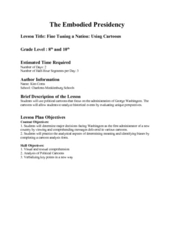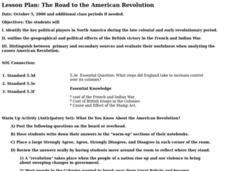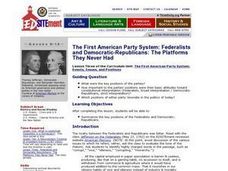Museum of Tolerance
The Role of Citizens in a Participatory Democracy
Groups research participatory democracies and compare the role and rights of citizens in ancient history with those in recent U.S. history. Guided by a series of questions, individuals compose a persuasive essay in which they discuss the...
Curated OER
Manners and Mores of Washington's America
Students explore the social policies of early America. In this etiquette instructional activity, students read George Washington's "110 Rules of Civility and Decent Behavior in Company and Conversation." Students identify expectations...
National Endowment for the Humanities
Walt Whitman to Langston Hughes: Poems for a Democracy
Explore the idea of democratic poetry. Upper graders read Walt Whitman, examining daguerreotypes, and compare Whitman to Langston Hughes. They describe aspects of Whitman's I Hear America Singing to Langston Hughes' Let America Be...
Curated OER
Demonstrating an Understanding the Evolution of Democracy in the United States
High schoolers explore how democracy in the United States changed and evolved from its birth to the present. They participate in a mock testing environment. Students write a multi-tasked essay on American government and politics.
Center for History Education
Democratic Ideas of the 1776 Maryland Constitution
1776 was a year of political upheaval in the American colonies. Academics examine the Maryland Constitution to understand the desire to break with Great Britain. Young historians learn about Maryland's efforts to extend rights to its...
Curated OER
Civil Rights and Americans with Disabilities
Pupils apply the principles of American democracy to people with disabilities. They analyze how individuals and groups in American society have struggled to achieve the liberties and equality promised in the principles of American...
National Endowment for the Humanities
The Power of the Majority over Thought
While Alexis de Tocqueville mourned a lack of "freedom of discussion" in America in the early republic, today's pupils are concerned about peer pressure. Using excerpts of de Tocqueville's writing and discussion questions, scholars...
Curated OER
African American Women Trailblazers
Young scholars take a closer look at the accomplishments of African-American women. In this African-American history lesson, students explore the work of Bessie Coleman, Gwendolyn Bennett, Lulu Madison White, and Zelma Watson George as...
Curated OER
African Americans in Science
Students explore the careers of prominent African Americans in science, mathematics, and technology. They use The Faces of Science: African Americans in the Sciences website, which includes profiles of past and present African Americans...
Curated OER
Americans Who Stood Up for Their Beliefs
Students will reflect upon the use of music to teach lessons throughout history. The focus of the study is based upon early American History. The tie of music and the abolition of slavery makes for interesting inquiry for learners.
Facing History and Ourselves
Taking Ownership of the Law
The work of building and maintaining a democracy is, in the words of Justice William Hastie, "never finished." To better understand what Hastie sees as an ongoing building process, class members listen to a seven-minute podcast about two...
Curated OER
Fine Tuning a Nation: Using Cartoons
Students examine political cartoons to gain an understanding of the political issues that George Washington faced. In this historical perspectives lesson, students analyze political cartoons about the National Bank, the title presidents,...
Curated OER
Three Visions for African Americans
Young scholars consider the plight of African Americans in post-Reconstruction America. In this African American history lesson, students discover the visions of African American leaders Booker T. Washington, W. E. B. Du Bois, and Marcus...
Curated OER
The Road to the American Revolution
Fifth graders explore the causes of the American Revolution. In this American Revolution lesson, 5th graders examine the people, places, and events that led to the outbreak of war in the colonies.
Chicago Historical Society
Are We the People?
Taking on the roles of a fiery Boston patriot, a Philadelphia merchant's wife, and a prominent abolitionist, your young historians will consider the reactions of these early Americans to the creation of the Declaration of Independence,...
Curated OER
Changes In The New Nation: New Beginnings
Young scholars consider the role of American newspapers in the revolution and plans for new government. In this early American history lesson, students determine how communication provided by newspapers contributed to the organization of...
National Endowment for the Humanities
Who Were the Foremothers of the Women's Suffrage and Equality Movements?
Young scholars complete a unit of lessons on the women who contributed to the early Women's Rights Movement in the U.S. They conduct Internet research, examine images online, develop a list of women, complete a worksheet, and create a...
Curated OER
The Federalist Defense of Diversity: Extending the Sphere
How did early Americans ensure expansion while also securing the rights of citizens? Alexander Hamilton and James Madison, two of our early leaders, considered the problem of faction to be the "mortal disease" that created unstable...
Curated OER
The First American Party System: Federalists and Democratic-Republicans: The Platforms They Never Had
Young scholars investigate the beginnings of the political party system in the US. They determine the key positions of both the Federalists and the Democratic-Republicans. They compare the views of the early political parties with those...
Curated OER
Building a Nation
Eighth graders identify the main ideas of the U.S. Declaration of Independence. They read and discuss text, read and summarize a section of the Declaration of Independence in small groups, and write a paper on why the colonists felt it...
Curated OER
Slavery and Empire 1440 - 1770
Students reflect on the events that led up to slavery in the early years of North America. For this United States History lesson, students read excerpts from the book "Out of Many," then gather in small groups to answer specific...
Curated OER
African Americans in Science
Students examine the life of renowned African American scientists. In this science literacy lesson, students explore a website containing profiles and achievements of past and present African American scientists. They prepare a poster...
Teaching for Change
A Documents-Based Lesson on the Voting Rights Act
How did the Voting Rights Act affect the daily lives of American citizens? A document-based lesson plan developed by the Student Non-Violent Coordinating committee (SNCC) presents a case study of the impact of the Voting Rights Act of...
Center for Civic Education
Citizenship Schools and Civic Education During the Civil Rights Movement and in the Present
Your young historians will discover the importance that citizenship education has played in the social progress of the United States as they learn about early efforts to discourage African Americans from voting in the 1960s.

























